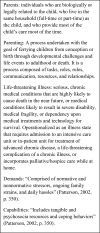Parental expectations of support from healthcare providers during pediatric life-threatening illness: A secondary, qualitative analysis
- PMID: 28888498
- PMCID: PMC5659330
- DOI: 10.1016/j.pedn.2017.05.008
Parental expectations of support from healthcare providers during pediatric life-threatening illness: A secondary, qualitative analysis
Abstract
Purposes: To explain parental expectations of support from healthcare providers for their parenting roles and goals during a child's life-threatening illness (LTI).
Design and methods: Qualitative interpretive study guided by the Family Adjustment and Adaptation Response Model. Thematic analyses were conducted with data from 31 semi-structured interviews of parents of children with LTI using systematic strategies to ensure rigor including audit trails and prolonged engagement.
Results: We identified three themes and one meta-theme or overall theme: (1) "Help us survive this," (2) "Let's fight together: please fight with me, not against me, to care for my family," and (3) "Guide me through the darkness: I am suffering." Overall, the parents conveyed that they expect mutuality with the health care providers and system in order to keep Fighting together for my family survival.
Conclusions: In the daily work of caring for their families, parents of children with LTI consider survival on multiple levels. They consider the life, illness, and potential death of one child while considering the on-going survival and sustenance of family relationships.
Practice implications: Parents are distressed and grapple with conflicted feelings about managing competing needs of various family members. Relationships with health care providers can influence parents' management of the situation and be a source of support as their parenting role changes over the illness trajectory, time, and in response to adversity.
Keywords: Palliative care; Parenting; Qualitative; Secondary analysis.
Copyright © 2017 Elsevier Inc. All rights reserved.
Figures
Similar articles
-
Parenting in Childhood Life-Threatening Illness: A Mixed-Methods Study.J Palliat Med. 2018 Feb;21(2):208-215. doi: 10.1089/jpm.2017.0054. Epub 2017 Oct 3. J Palliat Med. 2018. PMID: 28972873 Free PMC article.
-
Healthcare users' experiences of communicating with healthcare professionals about children who have life-limiting conditions: a qualitative systematic review protocol.JBI Database System Rev Implement Rep. 2015 Nov;13(11):33-42. doi: 10.11124/jbisrir-2015-2413. JBI Database System Rev Implement Rep. 2015. PMID: 26657462
-
Aims and tasks in parental caregiving for children receiving palliative care at home: a qualitative study.Eur J Pediatr. 2017 Mar;176(3):343-354. doi: 10.1007/s00431-016-2842-3. Epub 2017 Jan 11. Eur J Pediatr. 2017. PMID: 28078429 Free PMC article.
-
A Metasynthesis: Uncovering What Is Known About the Experiences of Families With Children Who Have Life-limiting and Life-threatening Illnesses.J Pediatr Nurs. 2018 Jan-Feb;38:88-98. doi: 10.1016/j.pedn.2017.11.004. Epub 2017 Nov 27. J Pediatr Nurs. 2018. PMID: 29357986 Review.
-
Impact of Pediatric Critical Illness and Injury on Families: An Updated Systematic Review.J Pediatr Nurs. 2020 Mar-Apr;51:21-31. doi: 10.1016/j.pedn.2019.10.013. Epub 2019 Dec 23. J Pediatr Nurs. 2020. PMID: 31874458
Cited by
-
Parents' experiences of initiation of paediatric advance care planning discussions: a qualitative study.Eur J Pediatr. 2022 Mar;181(3):1185-1196. doi: 10.1007/s00431-021-04314-6. Epub 2021 Nov 16. Eur J Pediatr. 2022. PMID: 34783898 Free PMC article.
-
The 2023-2026 Hospice and Palliative Nurses Association Research Agenda.J Hosp Palliat Nurs. 2023 Apr 1;25(2):55-74. doi: 10.1097/NJH.0000000000000935. J Hosp Palliat Nurs. 2023. PMID: 36843048 Free PMC article.
-
Relationships make research-and researchers - whole.Rev Esc Enferm USP. 2023 Aug 11;57:e2023E001. doi: 10.1590/1980-220X-REEUSP-2023-E001en. eCollection 2023. Rev Esc Enferm USP. 2023. PMID: 37565999 Free PMC article. No abstract available.
-
Enablers and barriers for hearing parents with deaf children: Experiences of parents and workers in Wales, UK.Health Expect. 2023 Dec;26(6):2666-2683. doi: 10.1111/hex.13864. Epub 2023 Sep 11. Health Expect. 2023. PMID: 37694502 Free PMC article.
-
Qualitative Methodology in Translational Health Research: Current Practices and Future Directions.Healthcare (Basel). 2023 Oct 1;11(19):2665. doi: 10.3390/healthcare11192665. Healthcare (Basel). 2023. PMID: 37830701 Free PMC article. Review.
References
-
- American Academy of Pediatrics Council on Community Pediatrics. Poverty and child health in the United States. Pediatrics. 2016;137(4):1–16. - PubMed
-
- Association for Children with Life-Threatening or Terminal Conditions and their Families and The Royal College of Paediatrics and Child Health (ACT/RCPCH) Integrated multi-agency care pathways for children with life-threatening and life-limiting conditions. Bristol: ACT/RCPCH; 2004.
-
- Bally J, Holtslander L, Duggleby W, Wright K, Thomas R, Spurr S, Mpofu C. Understanding parental experiences through their narratives of restitution, chaos, and quest: Improving care for families experiencing childhood cancer. 287–312. Journal of Family Nursing. 2014;20:287–312. doi: 10.1177/1074840714532716. - DOI - PubMed
MeSH terms
Grants and funding
LinkOut - more resources
Full Text Sources
Other Literature Sources
Medical


